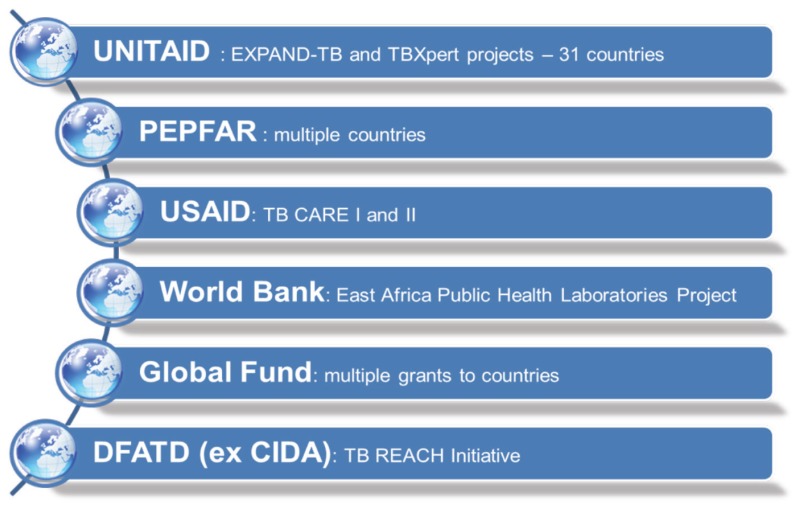The introduction of Xpert MTB/RIF into a country must be led by the Ministry of Health or the equivalent agency. In-country coordination is essential to optimize the use of resources, streamline activities, and ensure that sound technical advice is delivered and appropriate approaches are used. It is also fundamental to ensure that there is collaboration among national TB programme, HIV/AIDS programme, and public or private laboratory services.
To avoid duplicating efforts, WHO and its partners provide global-level coordination of the roll out of Xpert MTB/RIF. A dedicated web site has been established43 to map uptake of the Xpert MTB/RIF test; the web site also collects information from national TB programmes and implementing partners about the siting of the instruments and plans for additional procurement. Countries and partners embarking on the roll out of Xpert MTB/RIF are encouraged to share their activities and plans to ensure that information on the web site is as comprehensive and up to date as possible.
9.1. Knowledge sharing
In April 2011, WHO convened a meeting of early implementers of the Xpert MTB/RIF assay to refine the proposed diagnostic algorithms, develop a core set of variables to be used to determine the impact of introducing the technology on a laboratory's workload, and to clarify operational and logistical issues. A second meeting of early implementers followed in April 2012 during which participants shared experiences of introducing the assay under routine programmatic conditions.
A third Global Forum of Xpert MTB/RIF Implementers was convened in April 2013, in association with the fifth annual meeting of the Global Laboratory Initiative and its partners. During this meeting countries and their technical partners shared information about the lessons that had been learnt and the challenges encountered during scale-up; the discussions focused on providing evidence of the impact of scale-up and on linking scale up in diagnosis with improving access to treatment. The results of the testing strategies from the roll-out phase and the subsequent refinement of the strategies will be used to inform future efforts to scale-up Xpert MTB/RIF to the country level.
A dedicated task force at the Global Laboratory Initiative has developed a training package44 consisting of modules about the background, use and maintenance of the Xpert MTB/RIF assay; the modules include information about all of the steps necessary to implement the technology. The training package also includes specific modules about how to interpret results, and a clinical guidance module to help care providers correctly interpret and use the test results.
WHO maintains a periodically updated list of published evidence and commentary on Xpert MTB/RIF, which is categorized by topic45.
9.2. Donors supporting the roll-out of Xpert MTB/RIF
It is essential that the introduction of Xpert MTB/RIF is coordinated at the country level. Technical agencies and donors need to work within the framework of national TB programmes and HIV/AIDS programmes to assist in implementing Xpert MTB/RIF testing. Increase in the number of cases of TB and MDR-TB detected will require increases in the capacity for patient management and provision of anti-TB drugs.
It is necessary to ensure that cases of MDR-TB are accurately reported and forecast in order to guarantee an uninterrupted supply of quality assured medicines. In addition, sustained and prolonged technical assistance will be urgently required to rapidly increase the capacity to deliver care for patients with MDR-TB.
Many international donors have been active in supporting countries during the implementation of Xpert MTB/RIF testing. The Global Fund for AIDS, Tuberculosis and Malaria, UNITAID46, 47, US President's Emergency Plan for AIDS Relief and the United States Agency for International Development are some of the largest supporters of this technology in affected countries. Until August 2012, the high cost of Xpert MTB/RIF tests was a barrier to its introduction in low-income and middle-income countries. Since then, a total of 145 countries are benefitting from a 40% price reduction on the cartridges obtained by UNITAID, PEPFAR, USAID, and the Bill and Melinda Gates Foundation.
Footnotes
- 43
WHO monitoring of Xpert MTB/RIF roll-out: country and partner plans. Geneva: World Health Organization; 2013. [11.01.2014]. http://www
.stoptb.org /wg/gli/assets/documents/map/2/atlas .html.. - 44
Global Laboratory Initiative. Geneva: Stop TB Partnership; [11.01.2014]. http://www
.stoptb.org/wg/gli/. - 45
Published evidence and commentary on the Xpert MTB/RIF assay. Geneva: World health Organization; 2014. [30.01.2014]. http://www
.stoptb.org /wg/gli/assets/documents /map/XpertPublications.pdf.. - 46
Expand-TB project briefing note. [11.01.2014]. http://www
.who.int/tb /publications/factsheet_expand_tb.pdf.. - 47
TBXpert project briefing note. [11.01.2014]. http://www
.who.int/tb /publications/TBXpert_briefing_note.pdf..
Publication Details
Copyright
All rights reserved. Publications of the World Health Organization are available on the WHO web site (www.who.int) or can be purchased from WHO Press, World Health Organization, 20 Avenue Appia, 1211 Geneva 27, Switzerland (tel.: +41 22 791 3264; fax: +41 22 791 4857; e-mail: tni.ohw@sredrokoob).
Requests for permission to reproduce or translate WHO publications – whether for sale or for noncommercial distribution – should be addressed to WHO Press through the WHO web site (http://www.who.int/about/licensing/copyright_form/en/index.html).
Publisher
World Health Organization, Geneva
NLM Citation
Xpert MTB/RIF Implementation Manual: Technical and Operational ‘How-To’; Practical Considerations. Geneva: World Health Organization; 2014. 9, Collaboration and coordination.
